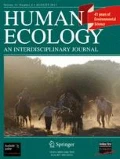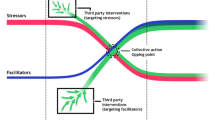Abstract
Social learning is hypothesized to result in shared knowledge and skills, trust, self-efficacy, and democratic decision-making for collective action. This paper uses a multi-method approach, including ethnography and nonparametric and multivariate statistics, to test this hypothesis and describe what specific process characteristics can predict social learning outcomes. Data are based on two communities, each with a subset of members participating in social learning processes for communal timber management and collective Brazil nut marketing in the Bolivian Amazon. Those who participated in the social learning process had significantly more knowledge about communal forest management, gained more skills, were more active in specific management activities, and had more intentions to work collectively than those who did not. The development of trust during the process, the equal involvement of all who participated, and the presentation of various ideas were most predictive of these outcome variables.


Similar content being viewed by others
References
Agresti, A. (1996). An Introduction to Categorical Data Analysis. Wiley, New York.
Bandura, A. (1977). Social Learning Theory. General Learning Press, New York.
Beekma, J., Zonta, A., and Keijzer, B. (1996). Base Ambiental Para El Desarrollo: Departamento de Pando y la Provincia Vaca Diez SNV. Riberalta, Bolivia
Berg, E. (1993). Rethinking Technical Cooperation: Reforms for Capacity Building in Africa. UNDP, New York.
Biedenweg, K. (2012). A Framework for Evaluating Forest Conservation Implications of Community-Based Capacity Building: Experiences from the Northern Bolivian Amazon. Conservation and Society 10(3): 256–269.
Chambers, R. (1986). Agriculture and Rural Problems: Normal Professionalism, New Paradigms and Development IDS Discussion Paper No. 227..
Chen, C.-K., and Hughes, J. J. (2004). Using Ordinal Regression Model to Analyze Student Satisfaction Questionnaires. IR Applications 1: 1–13.
Cronkleton, P., Albornoz, M. A., Barnes, G., Evans, K., and de Jong, W. (2010). Social Geomatics: Participatory Forest Mapping to Mediate Resource Conflict in the Bolivian Amazon. Human Ecology 38: 65–76.
Cronkleton, P., Pacheco, P., Ibarguen, R., and Albornoz, M. A. (2009). Reformas en la Tenencia Forestal en Bolivia: La Gestion Comunal en las Tierras Bajas. CIFOR - CEDLA, La Paz, Bolivia.
de Jong, W., Ruiz, S., and Becker, M. (2006). Conflicts and Communal Forest Management in Northern Bolivia. Forest Policy and Economics 8(4): 447–457.
INRA. (2008, 2 August). Pando, Primer Departamento Declarado Tierra Saneado. Paper Presented at The Instituto Nacional de Reforma Agraria, Cobija, Bolivia.
Keen, M., Brown, V. A., and Dyball, R. (2005). Social Learning: A new Approach to Environmental Management. In Keene, M., Brown, V., and Dyball, R. (eds.), Social Learning in Environmental Management: Towards a Sustainable Future. Earthscan, London, pp. 3–21.
Khodyakov, D. (2007). Trust as a Process: A Three-Dimensional Approach. Sociology 41(1): 115–132.
Leewis, C., and Pyburn, R. (eds.) (2002). Wheelbarrows Full of Frogs: Social Learning in Rural Resource Management. Royal Van Gorcum, Assen, The Netherlands.
Marsik, M., Stevens, F., and Southworth, J. (2011). Amazon deforestation: Rates and patterns of land cover change and fragmentation in Pando, northern Bolivia, 1986 to 2005. Progress in Physical Geography 35: 353–374.
Monroe, M. C., Andrews, E., and Biedenweg, K. (2007). A Framework for Environmental Education Strategies. Applied Environmental Education and Communication 6(3): 205–216.
Moran, E. (2006). People and Nature: An Introduction to Human Ecological Relations. Blackwell Publishing, Malden, MA.
Mostert, E., Pahl-Wostl, C., Rees, Y., Searle, B., Tabara, D., and Tippet, J. (2007). Social Learning in European River-Basin Management: Barriers and Fostering Mechanisms from 10 River Basins. Ecology and Society 12(1): 19.
Muro, M., and Jeffrey, P. (2008). A Critical Review of the Theory and Application of Social Learning in Participatory Natural Resource Management Processes. Journal of Environmental Planning and Management 51(3): 325–344.
Ormrod, J. E. (2003). Human Learning, 4th ed. Prentice Hall, New Jersey.
Ostrom, E. (1990). Governing the Commons: The Evolution of Institutions for Collective Action. Cambridge University Press, pp. 29–57.
Ostrom, E. (2010). Beyond Markets and States: Polycentric Governance of Complex Economic Systems. American Economic Review 100: 1–33.
Pahl-Wostl, C., and Hare, M. (2004). Processes of Social Learning in Integrated Resource Management. Journal of Community and Applied Social Psychology 14: 193–2006.
Poteete, A. R., Janssen, M. A., and Ostrom, E. (2010). Working Together: Collective Action, the Commons and Multiple Methods in Practice. Princeton University Press, Princeton, New Jersey.
Rist, S., Burgoa, F. D., and Wiesmann, U. (2003). The Role of Social Learning Processes in the Emergence and Development of Aymara Land use Systems. Mountain Research and Development 23(3): 263–270.
Schusler, T., Decker, D., and Pfeffer, M. J. (2003). Social Learning for Collaborative Natural Resource Management. Society and Natural Resources 15: 309–326.
Senge, P. M. (2006). The Fifth Discipline: The art and Practice of the Learning Organization. Currency Doubleday, New York.
SPSS. (2008). SPSS Statistics 17.0 Help Modules IBM. Chicago, Illinois.
Stoian, D. (2005). Making the Best of two Worlds: Rural and Peri-Urban Livelihood Options Sustained by Nontimber Forest Products from the Bolivian Amazon. World Development 33(9): 1473–1490.
Stoian, D., and Henkemans, A. B. (2000). Between Extractivism and Peasant Agriculture: Differentiation of Rural Settlements in the Bolivian Amazon. International Tree Crops Journal 10: 299–319.
Webler, T., Kastenholz, H., and Renn, O. (1995). Public Participation in Impact Assessment: A Social Learning Perspective. Environmental Impact Assessment Review 15: 443–463.
Wollenberg, E., Edmunds, D., Buck, L., Fox, J., and Brodt, S. (2001). Social Learning in Community Forests. CIFOR and the East–west Center, Bogor, Indonesia.
Acknowledgments
Funding was provided by an NSF Integrated Graduate Education and Research Training (IGERT) fellowship. Thanks to NGO directors and employees for their time providing and verifying data. The Centro de Investigación para le Preservación de la Amazonia Boliviana (CIPA) provided logistical support. Stephen Perz, Martha Monroe, Marianne Schmink, Bob Buschbacher, Christie Staudhammer, and Taylor Stein provided valuable feedback on initial drafts. Micaela Peralta and Nelson Gordillo assisted with data collection.
Author information
Authors and Affiliations
Corresponding author
Rights and permissions
About this article
Cite this article
Biedenweg, K., Monroe, M. Teasing Apart the Details: How Social Learning can Affect Collective Action in the Bolivian Amazon. Hum Ecol 41, 239–253 (2013). https://doi.org/10.1007/s10745-012-9535-y
Published:
Issue Date:
DOI: https://doi.org/10.1007/s10745-012-9535-y




